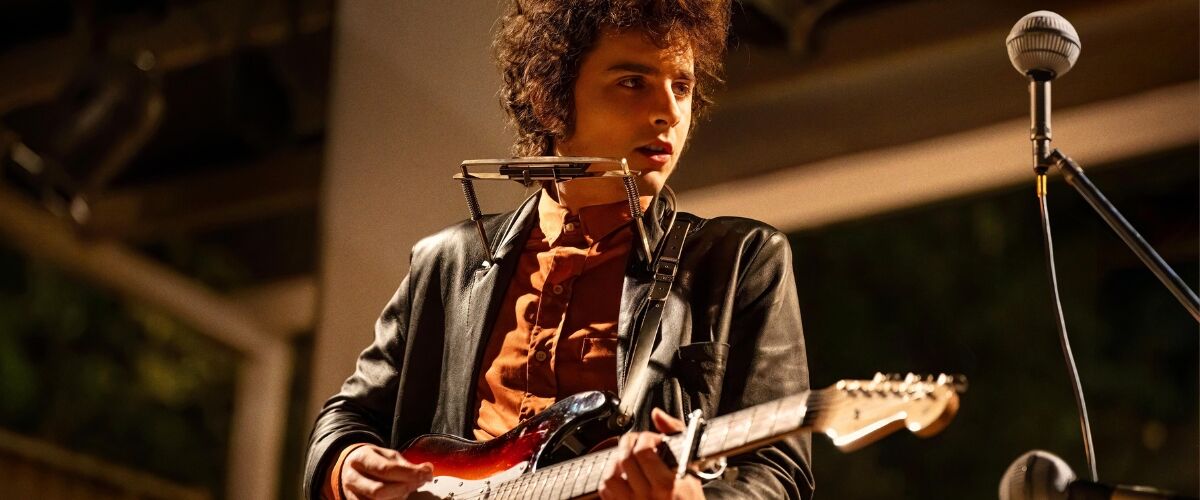Bob Dylan has always existed in a space between legend and enigma, a figure both omnipresent and unknowable. His music has been dissected, his career mapped in exhaustive detail, and yet, he remains elusive, just out of reach, slipping between personas as easily as he changes the cadence of a lyric, so any film attempting to capture Dylan’s essence must wrestle with that inherent slipperiness. James Mangold’s A Complete Unknown takes on the challenge, zeroing in on Dylan’s early days in the Greenwich Village folk scene of the 1960s, in the moments before he crystallised into an icon.
Mangold (Ford v Ferrari, Logan) is no stranger to crafting films about musical legends, having previously shaped Johnny Cash’s story in 2005’s Walk the Line. There’s a familiar rhythm here: an artist on the brink, a sound that’s still being refined, a growing resistance to the forces of expectation. Boyd Holbrook’s (The Predator) swaggering Cash even makes an appearance, a ghost of Mangold’s earlier work stepping into Dylan’s world with an unspoken understanding, two artists who know exactly what it means to be drawn toward reinvention.

Dylan has been the subject of countless films, from Martin Scorsese’s deep-dive documentaries (No Direction Home, Rolling Thunder Revue) to Todd Haynes’ (May December) fragmented, multi-actor experiment musical drama I’m Not There (2007) but Mangold’s approach is more traditional by comparison, painting Timothée Chalamet’s (Dune, Wonka) Dylan as an opaque figure who speaks in clipped phrases that suggest he’s already seeing ten steps ahead of the conversation. Like everyone around him, we watch and wait for a glimpse behind the curtain, knowing full well that Dylan, as always, will never let us all the way in.
He arrives in New York in 1961, a 19-year-old kid with a rucksack, a guitar case that feels like an extension of his body, ambition, and a head full of borrowed songs. That journey leads him to the bedside of Woody Guthrie (Scoot McNairy, Argo), the folk hero whose voice shaped Dylan’s early music. The hospital room is quiet, Guthrie unable to speak, his body ravaged by Huntington’s disease.
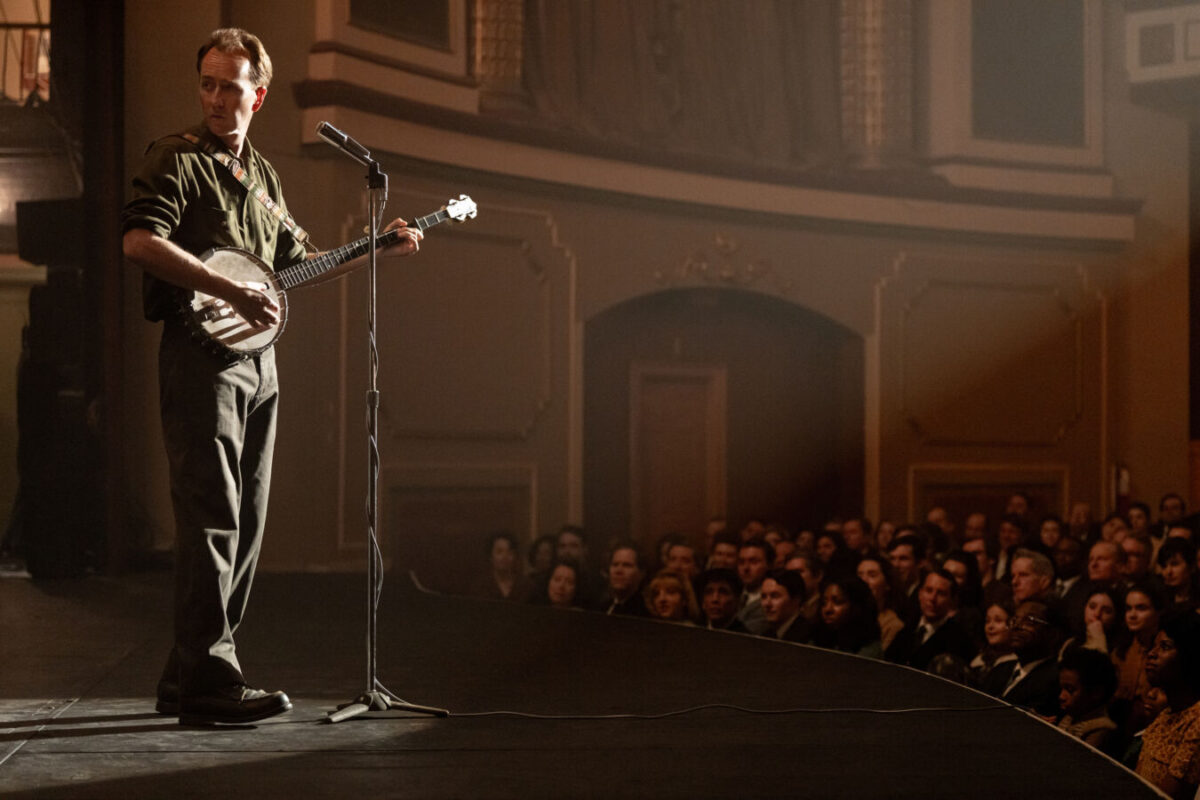
Fellow folk singer Pete Seeger (Edward Norton, Fight Club) is there too, a legend in his own right, but Dylan barely acknowledges him. In one of the film’s most moving moments, Dylan plays “Song to Woody”, an offering to a mentor who can no longer respond. Guthrie’s face softens, a flicker of recognition passing over his gaunt features. That moment, Chalamet, hunched over a guitar, pouring himself into a voice that isn’t quite his own yet, feels electric. Chalamet’s voice is raw, nasal, slightly clenched, yet steady. The phrasing, the cadence, the way each word is carefully unspooled… it’s Dylan, but also Chalamet, inhabiting the music rather than merely performing it.
Fame, when it comes, is less of an ascent than a whirlwind. Dylan doesn’t rise so much as he explodes, leaving those around him scrambling to keep up. The film captures this rush, showing how his success leaves Seeger in its wake, even as the elder musician watches with a mixture of admiration and quiet resignation, as Norton plays him with a gentle steadiness, never bitter, just aware of the changing tide. His performance of Guthrie’s “This Land Is Your Land” outside a courthouse, delivered after being convicted for contempt of Congress, carries an earnestness that feels almost out of place next to Dylan’s enigmatic cool. He’s a relic of a movement built on collective action, while Dylan, from the start, walks his own path.
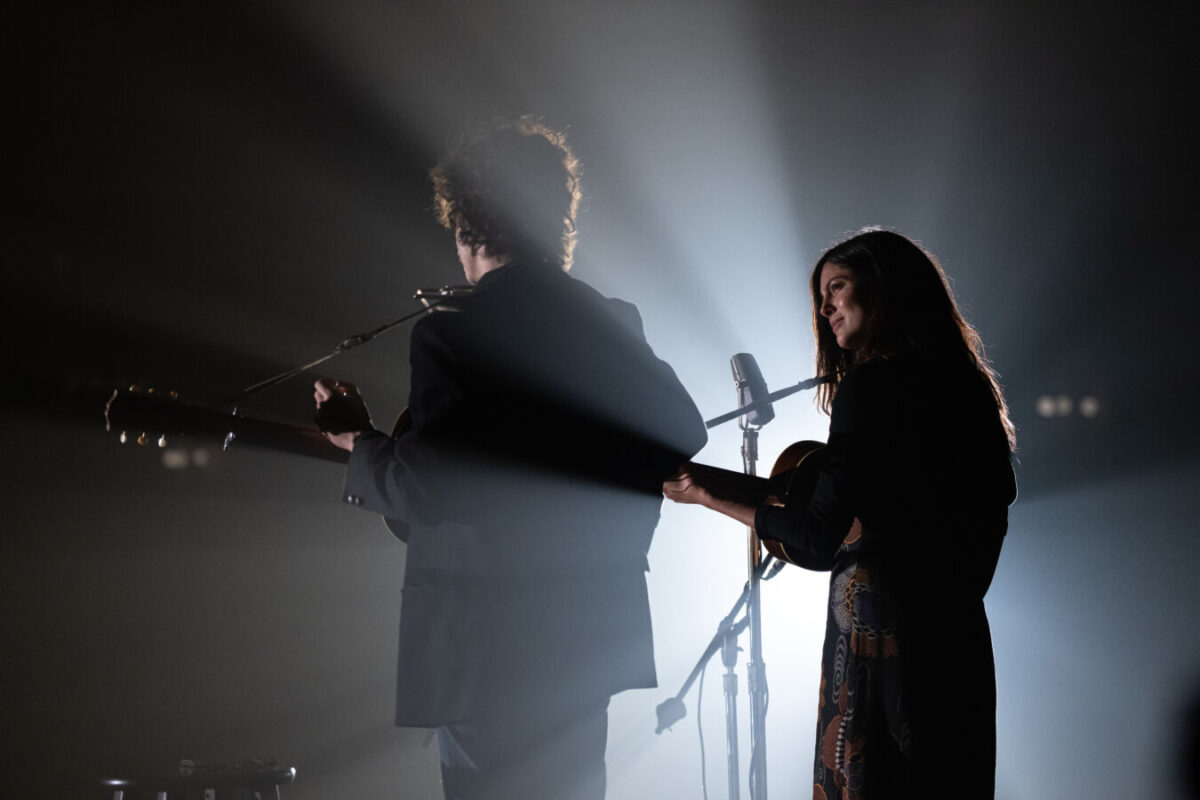
When contemporary folk songstress Joan Baez enters Dylan’s life, there’s a sense of harmony, both literal and metaphorical. Monica Barbaro (Top Gun: Maverick), in a performance that easily stands among the film’s strongest, embodies Baez with a mixture of confidence and warmth, a woman sure of her place in the world even as Dylan begins to outpace her. On stage, their duets crackle with energy, her voice ringing clear and steady while his remains rough, a contrast that makes their chemistry impossible to ignore. Offstage, it’s a different story, with Dylan’s praise always coming laced with condescension. His assessment of her songwriting (“like an oil painting at the dentist’s office”) is both a compliment and a dismissal, a pattern that repeats itself as their relationship unfolds. Luckily, Barbaro never lets Baez dissolve into a woman seeking validation, responding with quiet defiance. “You’re kind of an asshole, Bob,” she tells him, cutting through his charm with brutal honesty. It’s a rare moment where someone refuses to orbit Dylan’s ego, one of the film’s most satisfying exchanges.
Chalamet plays Dylan as a man in constant retreat, slipping away from anyone who dares to know him too well. The women in his life who try (and fail) – Baez, and more poignantly, Sylvie Russo – are left in his wake. Elle Fanning (The Great) brings a delicate, unspoken sadness to Sylvie, the woman who meets Dylan before he’s a legend, back when he’s just a kid with a guitar and something to prove. Inspired by real-life artist Suze Rotolo, Sylvie is an activist entrenched in the civil rights movement, her fire for justice igniting something in Dylan’s songwriting. His music up to that point had been folk covers that barely sold, but with Sylvie in his life, he begins to write his own songs, creating the anthems that will define a generation: “Masters of War”, “A Hard Rain’s A-Gonna Fall”, “The Times They Are a-Changin’”.
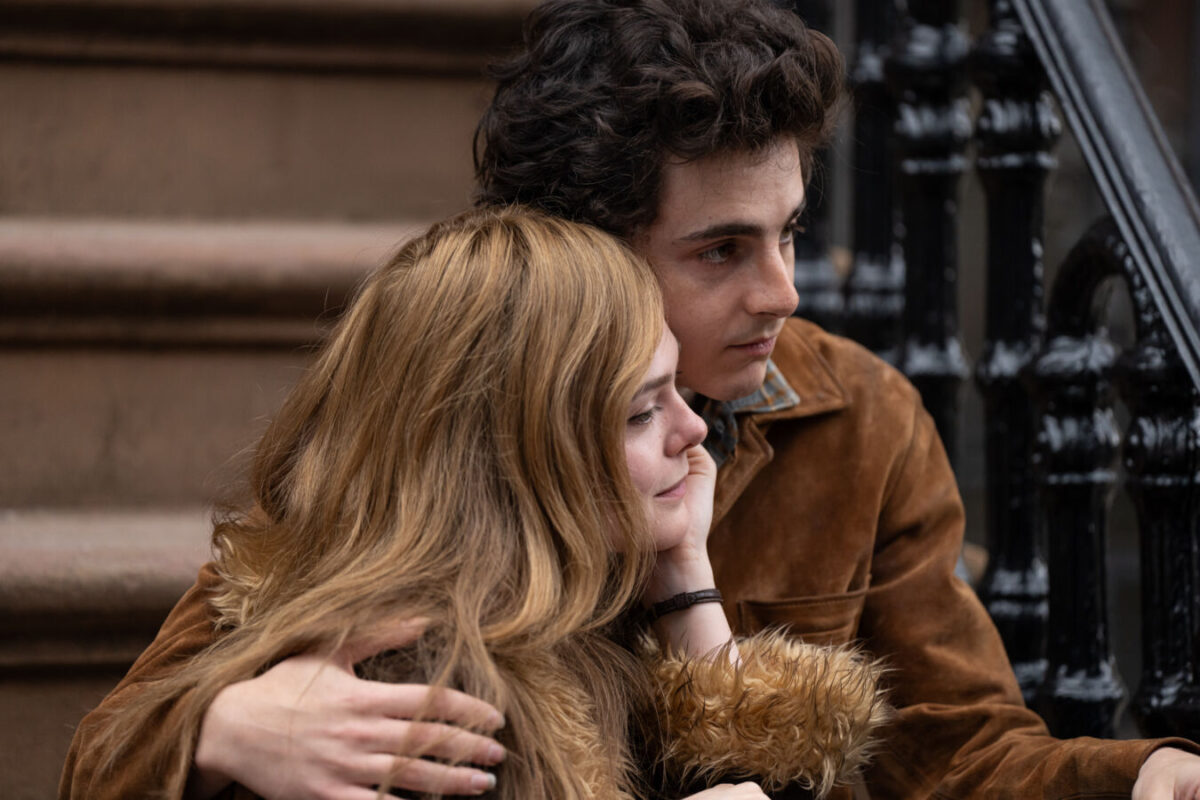
Sylvie isn’t naïve, but she trusts Dylan longer than she should. While his star ascends, hers stays steady, her devotion unwavering even as he pulls further away. Fanning plays her with a grace that makes it clear she knows exactly how this story will end, but she follows Dylan anyway, hoping for something more than scraps of affection. Even after he betrays her, he comes back, drawn to the stability she provides. But by then, she’s done waiting. She walks away, and Dylan, for once, doesn’t chase. It’s a quietly devastating moment, and one that underlines A Complete Unknown’s refusal to romanticise its subject, choosing to linger on those left behind: the people who tried to decode him, and the ones who knew, even then, that he would never truly belong to them.
That title, however, feels like a deliberate misnomer. Dylan is a complete unknown for all of five minutes before his charisma and talent carve out space for him in the Greenwich Village folk scene. What he remains, for two more hours, is unknowable. It’s hard to say how viewers not already invested in Dylan’s music will respond to a protagonist this closed-off. He writes to Cash that fame “snuck up” on him and “pulverised” him, yet the film doesn’t dig much deeper than that. His reluctance to be understood becomes the film’s own limitation – by refusing to speculate, it often leaves itself with little to say.
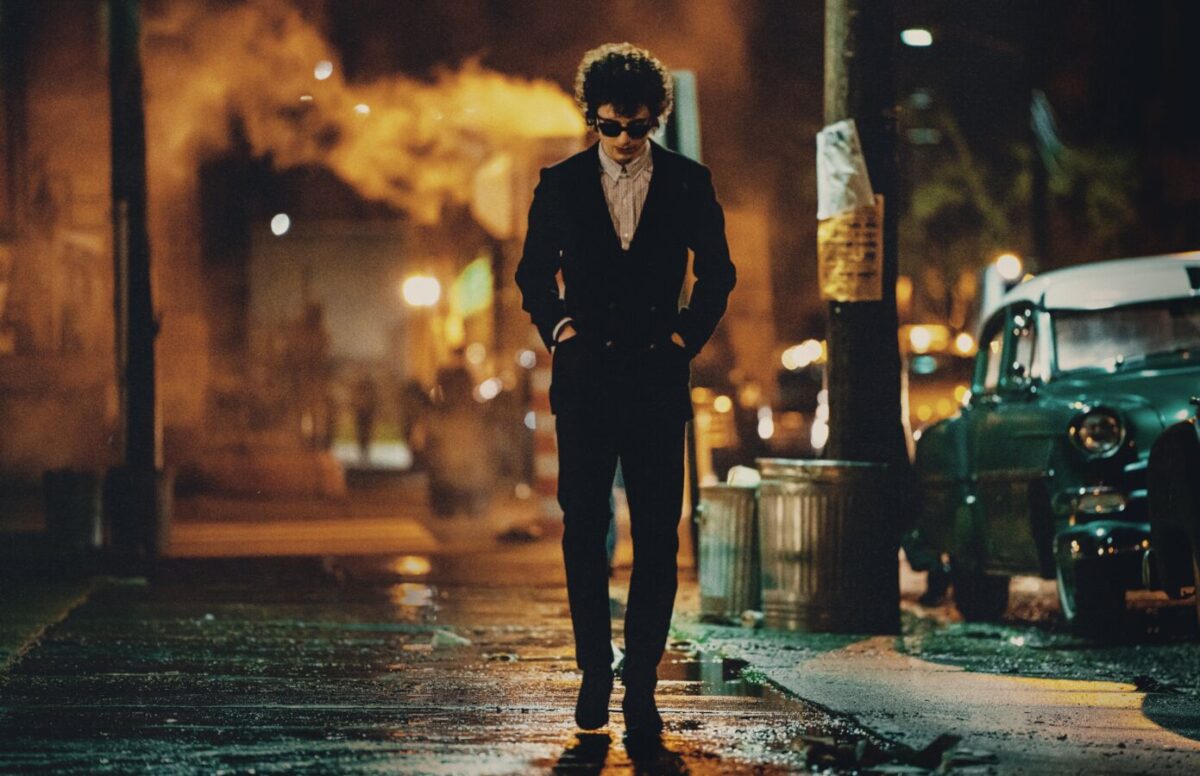
As the film moves into its later acts, that sense of repetition sets in. Dylan hides behind sunglasses, speeds through the Village on a motorcycle, and dodges fans with the same irritation every time he’s recognised. His transformation from folk hero to rock star should be the heart of the film, yet the conflict surrounding his controversial decision to go electric at the 1965 Newport Folk Festival arrives too late in the film to have much impact. Based on Elijah Wald’s 2015 book Dylan Goes Electric!, the screenplay structures itself around the culture clash between Dylan and folk purists like Seeger and festival organiser Alan Lomax (Norbert Leo Butz, The Exorcist: Believer), but it treats the moment more as an inevitability than a real turning point. The emotional charge comes instead from the music itself, particularly when Dylan plugs in for “Maggie’s Farm”, “Like a Rolling Stone”, and “Phantom Engineer” as the audience splits into cheers and jeers (mostly jeers). His final song at Newport, a solo acoustic rendition of “It’s All Over Now, Baby Blue”, plays like a farewell to his folk roots, a parting nod before he moves on to something new.
Dylan was never going to stay where people wanted him and A Complete Unknown captures that restless motion, the constant reinvention, but in doing so, makes no attempt to impose understanding on an artist who has spent his life resisting definition. Purists may balk at its liberties, like shifting the infamous “Judas!” heckle from the 1966 Royal Albert Hall concert to the 1965 Newport Folk Festival, but accuracy has never been the point. Truth, after all, was never the business Dylan was in. A Complete Unknown understands that Dylan’s greatest trick has always been his ability to make us believe, even when we know better. He sings in riddles, rewrites his own history, and walks away before anyone can pin him down. For many, that will be frustrating. For others who see Dylan not as a puzzle to be solved but as a presence to be experienced, that may be enough. Like a great song, the film doesn’t demand a singular reading – it invites many. Believe what you want.
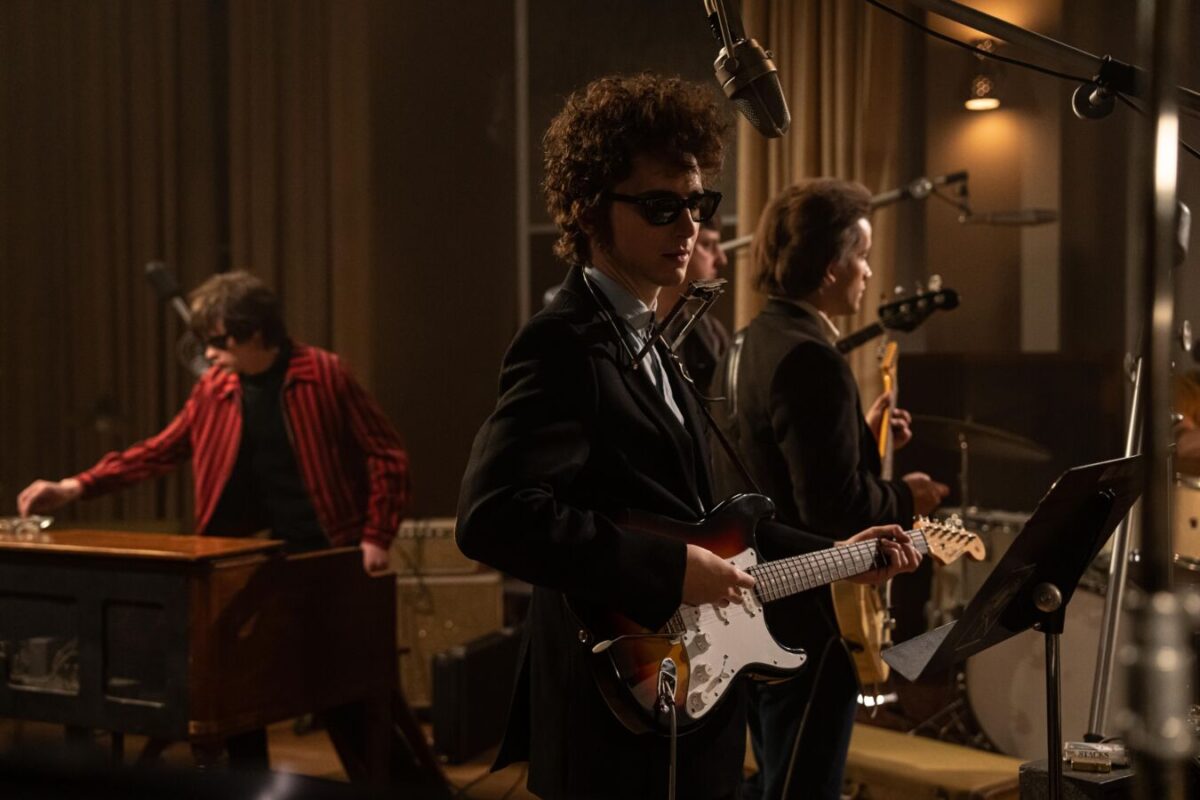
Some figures aren’t meant to be fully understood, and A Complete Unknown seems to know that Dylan wouldn’t have it any other way.
GEEK REVIEW SCORE
Summary
A Complete Unknown offers no neat resolutions, just a shrug, a smirk, and a song that might mean everything or nothing at all. Maybe it’s all over now, baby blue. Or maybe it’s just beginning.
Overall
7.9/10-
Story - 7/10
7/10
-
Direction - 8/10
8/10
-
Characterisation - 9/10
9/10
-
Geek Satisfaction - 7.5/10
7.5/10

